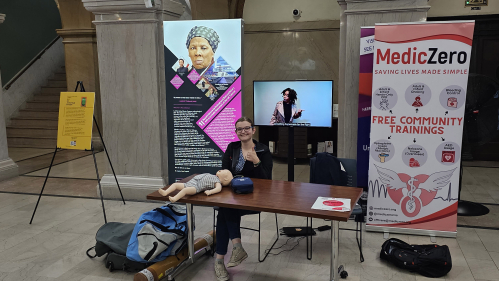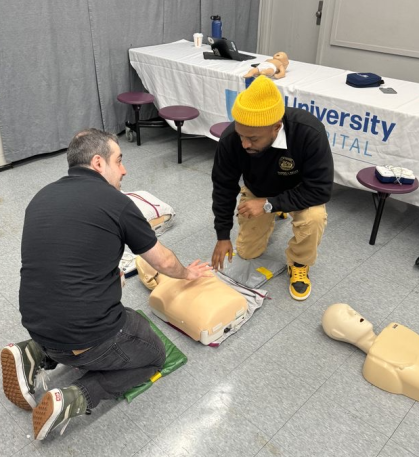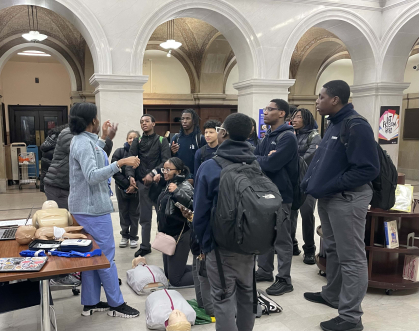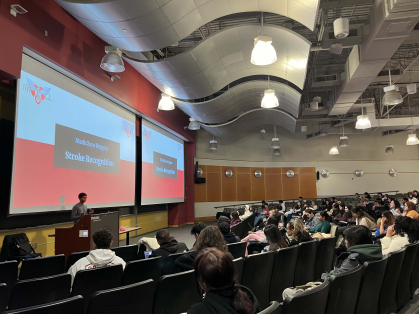MedicZero: Saving Lives by Transforming Bystander Emergency Response

The Rutgers alumni–backed nonprofit is empowering bystanders to save lives through interventions such as hands-only CPR
Rutgers University alumni are leading a transformative movement in improving bystander emergency response times by equipping the public with life-saving skills through their nonprofit organization, MedicZero.
Founded in 2020 by Rutgers–New Brunswick’s School of Arts and Sciences students Aditya Jain, ’23, William Flemming, ’21, Pranya Gaddipati, ’23, Yash Patel,’23, and Rajat Ramekar, ’21, MedicZero’s mission is to make emergency medical skills easy and accessible for people to learn. They train individuals in hands-only CPR, techniques to control bleeding and recognizing signs of a stroke. Four of the five founders currently serve on the board of directors, where they continue to guide and advise the organization’s projects and operations.

The initiative began at Rutgers–New Brunswick as a club focused on hosting journal clubs on evidence-based emergency medicine and training on-campus bystanders. Club leadership and members organized stroke recognition presentations, informational tabling events and hands-only CPR trainings. Eventually, the founding members decided to establish the non-profit organization MedicZero Inc., launching other projects while maintaining the Rutgers–New Brunswick chapter and expanding to other universities in the region.
Co-founder and Rutgers New Jersey Medical School (NJMS) student William Flemming, ’26 named MedicZero, drawing inspiration from Seattle’s Medic II CPR Training Program, which has trained residents since 1971 to improve bystander response to cardiac arrest.
“We aim to train bystanders to initiate care before the ‘first’ responders,” said Flemming, adding that the “zero” signifies that bystanders become the “zeroth” medical provider on the scene, initiating care before emergency first responders arrive.
“Early CPR is one of the most important factors in neurologically intact survival after a cardiac arrest,” said Elizabeth Blizzard, ’27, an NJMS student and MedicZero’s chief clinical officer. “Unfortunately, CPR is often delayed until the arrival of EMS, especially in vulnerable communities with limited access to training. We hope that by providing free CPR education, more cardiac arrest victims in the greater Newark area will walk out of the hospital to rejoin their loved ones.”

The nonprofit, which is completely volunteer-run and funded through grants, donations and partnerships with local health agencies and community organizations, has educated more than 8,000 bystanders throughout the tri-state area and expanded grassroots efforts to other higher education institutions, including Temple University, Seton Hall University, University of Connecticut and New Jersey Institute of Technology—enhancing public preparedness in emergency situations and providing life-saving information.
The urgency of MedicZero’s work is underscored by a stark reality: Every minute of delay in CPR reduces a cardiac arrest victim’s survival by 7 to 10 percent. Immediate bystander intervention is crucial, with an average ambulance response time of seven minutes to more than 14 minutes in rural areas.
Through an affiliate partnership with NJMS, a number of first aid and CPR trainings have been held in Newark for the local community. Led by Blizzard, these lifesaving training events currently involve nine current NJMS students. Since MedicZero’s founding, 46 current and former Rutgers–New Brunswick students have contributed to training efforts throughout New Jersey.
“We have trained approximately 300 Newark residents and hope to train many more,” Blizzard said.
In addition to CPR, MedicZero places a strong emphasis on stroke education. “Unfortunately, many people are unaware that the average bystander takes approximately five hours to seek emergency care, during which 1.9 million neurons die per minute, making patient recovery and survivability increasingly bleak the longer it’s left untreated,” said Utkal Nimse, ’26, a student at the Rutgers School of Arts and Sciences, and MedicZero’s chief training officer.
MedicZero’s stroke recognition presentations are held at universities that have established chapters, educating students on how to recognize the signs of a stroke. The organization’s first publication, Building Stroke-Ready Communities: The Importance of Bystander Stroke Education, was published this year in the Journal of Emergency Medical Services and is geared to emergency medical service researchers, fellow MedicZero members and individuals committed to advancing bystander education and intervention efforts.

The publication, led by Tung-lin Jesse Yuan, assistant professor of emergency medicine at NJMS and assistant EMS medical director at University Hospital, highlights significant delays in stroke recognition because of insufficient bystander education and underscores the importance of educational interventions.
“Our article highlights how early stroke recognition enables prompt medical intervention, which can significantly improve patient outcomes,” Yuan said. “As an EM/EMS physician, this topic is incredibly important to me as we see patients everyday suffering from strokes, and we see firsthand how every second truly matters. I have been incredibly proud to work with MedicZero and look forward to doing more with community education.”
To contact MedicZero, email officers@mediczero.org. Learn more about the organization here.


